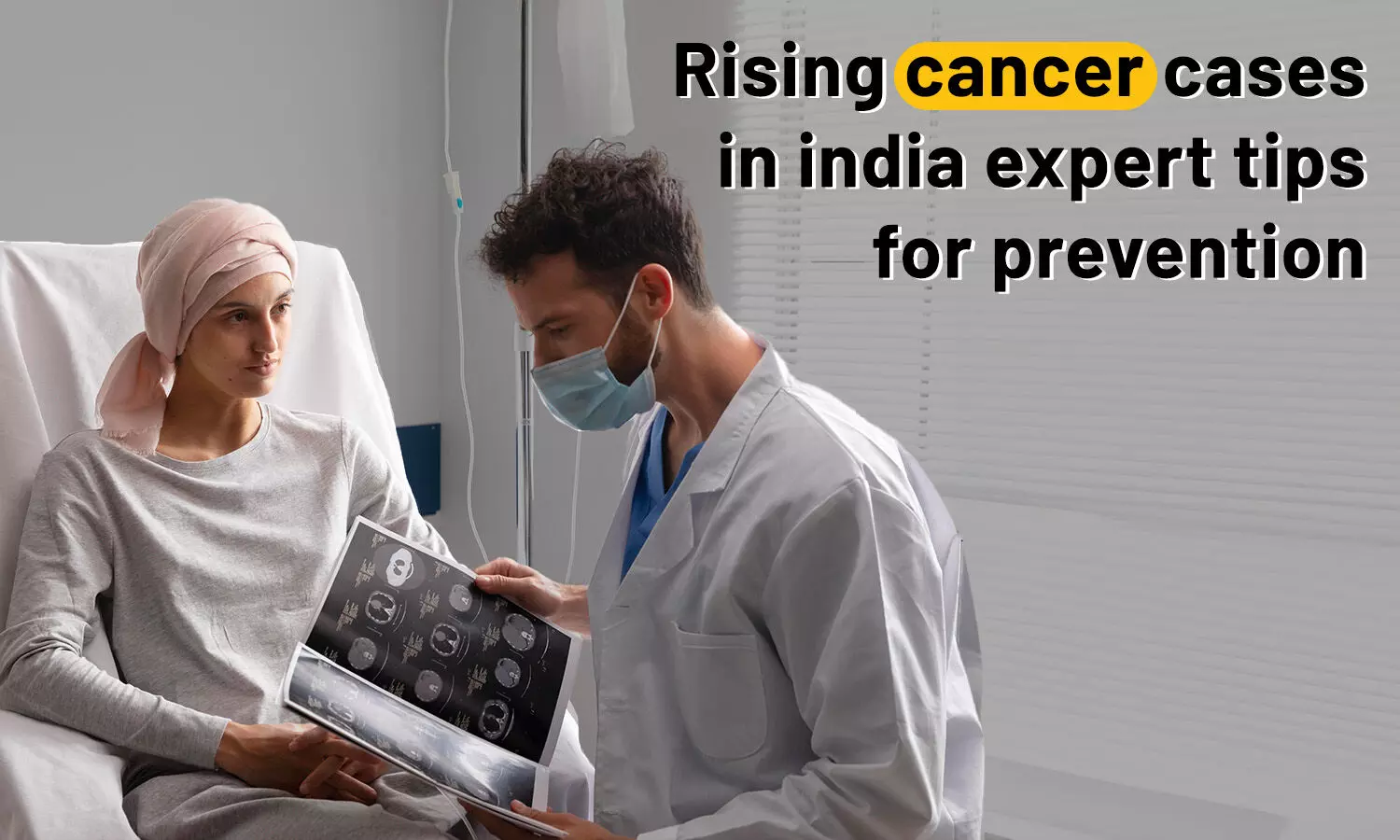India is witnessing a sharp rise in cancer cases: Expert tips to prevent it
The word cancer is common; however, living with the disease is daunting and challenging. Thus, the onus is on you to live a healthy and wealthy life.
image for illustrative purpose

A recent report by Apollo Hospitals Health has spotlighted India's healthcare landscape, labelling the nation the "cancer capital of the world." The survey also revealed a harrowing trend in the increase of non-communicable diseases, with cancer cases leading the way nationwide.
Highlighting the same trend, the Indian Council of Medical Research-National Centre for Disease Informatics and Research (ICMR-NCDIR) published a report on World Cancer Day 2024 stating that in 2022, the expected number of cancer cases was 1,461,427, with a crude incidence rate of 100.4 cases per 100,000 people. However, with the changing times, it is now anticipated that the number of cancer incidences will rise by 12.8% by 2025 compared to the last few years.
With millions of Indians facing and battling the disease, recognising the most common type of cancer and taking prevention measures became vital steps.
Types of Cancer in India
Cancer has undeniably become a major global concern, and India is no exception. The number of cancer types rising in our nation is primarily due to a confluence of lifestyle and environmental factors. In truth, the most common malignancies in India vary slightly between men and women.
So, let's discuss it in detail:
Lung cancer: Lung cancer starts with the growth of cells in the lungs. In fact, due to the rising trend of smoking in men and women, it has become the leading cause of cancer death worldwide. Furthermore, indoor air pollution from cooking fuels, as well as exposure to outdoor toxins, has been linked to an elevated risk of lung cancer.
Prostate cancer: Prostate cancer is a type of cancer that occurs in the prostate gland (a walnut-sized gland that produces seminal fluid, which helps in nourishing and transporting sperm). Prostate cancer, the most frequent type of cancer in men, will double to around 71,000 new cases annually in India by 2024, according to the International Agency for Research on Cancer.
Colorectal cancer: India is seeing a significant rise in colorectal cancer cases with the dietary shifts towards junk and processed food. Obesity, unhealthy lifestyle choices, and genetic predispositions are other factors that affect this increase. Thus, focusing on the importance of a healthy diet, normal exercise and a balanced weight is crucial to lowering the risk of developing this form of cancer.
Breast cancer: According to the ICMR, breast cancer held the top spot among women in India. The factors contributing to the rise include late marriage and childbirth, limited breastfeeding and various other lifestyle choices. In addition, genetic predisposition also plays a significant role, with BRCA1, BRCA2, and PALB-2 gene mutations being more prevalent in certain areas of India, as per the WHO.
Cervical cancer: Human papillomavirus (HPV) is the primary cause of cervical cancer, which is the second most prevalent cancer in Indian women. This cancer develops slowly over time, and if abnormal cells are not eliminated or removed, they can turn into cancer cells and begin to proliferate and spread deeper into the cervix and surrounding tissues.
Cancer prevention recommendations by experts
Undeniably, today, the word cancer is common, but living with the disease is daunting and challenging. This is where prevention and early detection are key to combating this deadly disease. Here are some key steps Indians can take:
Say 'yes' to a balanced diet: A balanced diet high in fruits, vegetables, and whole grains, combined with frequent exercise and antioxidants, is an effective protective intervention. A study published in the Nutrition Journal states that antioxidants like carotenoids (α-carotene, ß-carotene, lycopene, lutein, and cryptoxanthin) as well as selenium, folic acid, vitamin B-12, vitamin D, and chlorophyll are preventive components in a diet for preventing cancer. Furthermore, limiting processed foods, red meat, and sugary beverages is also important.
Say 'No' to bad habits: Alcohol drinking and tobacco use, including smoking and chewing tobacco, are major risk factors for several cancers. As a result, quitting smoking and alcohol greatly lowers the risk of lung cancer and other diseases related to it.
Know your family history: There is a genetic component to some cancers. So, if you have a family history of cancer, discuss it with your doctor and consider getting screened at an earlier age. Because early detection is the only way to be safe.
Regular checkups: Don't ignore potential warning signs such as yellowing, darkening or redness of the skin, sores that won't heal, or changes in the bowel, among others. So, if you feel any sort of pain, schedule a checkup with your doctor and undergo recommended screenings for specific cancers. Early detection significantly improves treatment outcomes.
It is a collective fight!
There is no denying that cancer's impact goes well beyond statistics. It interrupts people's lives, puts financial strain on families, and places a strain on the healthcare system, resulting in excruciating physical and emotional distress. Cancer, while a terrible foe, is not unbeatable. With increased knowledge, prevention, and early detection, India can turn the tide on this public health issue, assuring a healthier future for its people.

